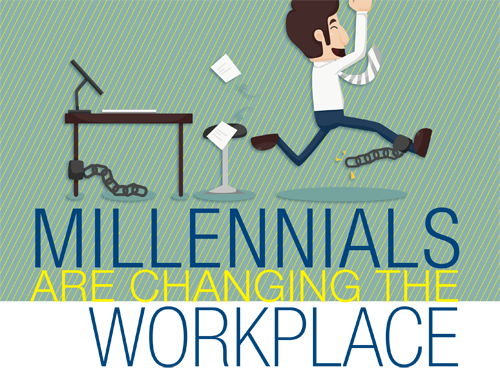Millennials are changing the workplace

by Mary Jawgiel
Sociologists who study generational differences in our society have labeled those born
between 1980 and around the year 2000 as the Millennial generation. The first of this generation began entering the work force in 1998 (as 18 year olds) and are soon to be more numerous in the workforce than Baby Boomers. The workplace has been absorbing Millennials for some 17 years and over that same time the workplace has changed in many ways.
Are those changes due to the need to incorporate Millennials into the workforce or are Millennials just simply demanding to take advantage of cultural workplace shifts in attitude? It’s hard to know for sure, but these changes reflect the desires many Millennials have expressed they would like to see in their workplace, such as flexible work hours, a better work/life balance, more comprehensive workplace training and a more racially diverse workforce.
Is your workforce changing with the times?
Flexibility
Back in the early 1990s there was little, if any, discussion about company work hours. If you were hired for a position, you worked the same hours as everyone else – generally something like 8:30 or 9:00 am to 5:00 pm, with a break for lunch. If you had a doctor’s appointment, a parent-teacher meeting or some type of delivery or home repair that needed scheduling, you were expected to do it outside of the workday – evenings or Saturdays. People did not take time off to deal with personal/family issues. And, working from home was pretty much unheard of back then as well.
Fast forward to 2015, and you can see the Millennial influence just about everywhere. Millennials believe in work hour flexibility as well as being able to work remotely whether that be from home, coffee shop or get-away vacation. Nowadays all employees (not just Millennials) in many corporations are able to choose their start and end times within a range of options. And working from home (or elsewhere) has become commonplace.
Employers are now more willing to let someone leave early to attend a child’s school activities and then answer email or return phone calls later in the evening.
Work/Life Balance
A cousin of flexibility, work-life balance, has become a rallying cry for Millennials. Millennials don’t want to feel they are giving up their personal lives for work. They refuse to repeat what their parents experienced in allowing work to be all-consuming at the expense of family time. Today, new dads have family leave so they have an opportunity to bond with their newborns along with new moms. Have a parent or other family member who is recuperating from an illness and needs to have someone with them to help? Take family leave. The Family and Medical Leave Act (FMLA) has certain criteria that need to be met and pertains to organizations with 50 or more employees, but offers up to 12 weeks unpaid leave without threat of losing your job.
Nowadays, if you have a sick child and can’t find someone to stay with them or you need to schedule the plumber to fix the leak in your pipe, you may be able to call in and “work from home” while you deal with your personal life. Employers recognize if they are to get the best and brightest, they need to offer work/life balance to keep their superstars highly engaged.
Training vs. Coaching/Mentoring
Workforce training in the past consisted of either opening up a training manual and reading about the product or procedure, and then trying your hand at doing it (usually done right before you needed to accomplish something and searching throughout the manual for the right page). Another strategy was being sent to a large pre-scheduled training session (on- or off-site) with many other people from different companies or divisions and listening to an instructor tell you how to produce the expected results. These sessions were not always scheduled when you needed to learn something, so you could very well already know how to do that installation, or not need the information on how to do the install for months.
Today, much of the product and procedural training has been moved online. It offers new employees the opportunity to learn what they need when they need it and to have an easy way to go back and review what they’ve learned. Online training is often “chunked” so it’s easy to find what you are looking for when you need it.
Another concept in the field of training is using a coach and/or a mentor to help new employees better understand the business as well as the skills and procedures needed to perform their job at the highest level. Although coaching and mentoring are not new concepts, in the past they have been more informal. Nowadays, companies are assigning coaches and/or mentors to new employees so they have someone to turn to with questions.
Workforce Diversity
Millennials have the highest percentage of minority members than any prior generation. Depending on what study you read, the percentage of minorities runs from 41 percent 50 percent of the population. This statistic is changing what the work force looks like; the faces of our future employees and leaders are not the same as they were a few years ago. This brings new customs, ideas and new ways of doing things into the workplace. It also means change, so expect to see even more workplace changes in the future.
Take a look around your own organization and see if your company has changed over the years by offering more flexibility, a better work/life balance, modern training programs and a more diverse team of employees. If these changes have not yet been incorporated into your business, they will be soon.
 Mary Jawgiel is ICP program director for the PTDA Foundation and manages the ICP Job Board at http://jobs.idcareers.org. Mary’s life-long passion has been working with young people. Industrial Careers Pathway (ICP) is a cross-industry initiative supported by American Supply Association (ASA), the Industrial Supply Association’s (ISA) Education Foundation, National Association of Electrical Distributors (NAED), NAHAD–the Association for Hose and Accessories Distribution, NIBA-The Belting Association and the PTDA Foundation. For more insights on recruiting, hiring and training Millennials in the distribution industry subscribe to the ICP Talent Tipsheet at www.industrialcareerspathway.org/tipsheet.
Mary Jawgiel is ICP program director for the PTDA Foundation and manages the ICP Job Board at http://jobs.idcareers.org. Mary’s life-long passion has been working with young people. Industrial Careers Pathway (ICP) is a cross-industry initiative supported by American Supply Association (ASA), the Industrial Supply Association’s (ISA) Education Foundation, National Association of Electrical Distributors (NAED), NAHAD–the Association for Hose and Accessories Distribution, NIBA-The Belting Association and the PTDA Foundation. For more insights on recruiting, hiring and training Millennials in the distribution industry subscribe to the ICP Talent Tipsheet at www.industrialcareerspathway.org/tipsheet.
This article originally appeared in the March/April 2015 issue of Industrial Supply magazine. Copyright 2015, Direct Business Media.













